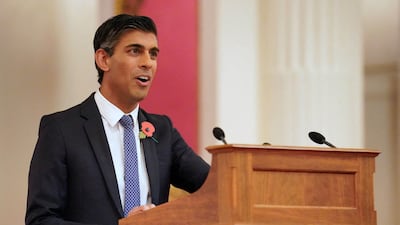Pensioners could be in line for an inflation-linked rise in Thursday's autumn statement after Prime Minister Rishi Sunak said the generation was “at the forefront of my mind”.
He and Chancellor Jeremy Hunt are considering up to £60 billion ($70.51bn) in tax rises and spending cuts in the autumn budget.
But Mr Sunak hinted they could avoid real-terms cuts on state pensions by increasing them in line with soaring inflation in a sign the triple lock could be protected.
Members of his Cabinet, including Michael Gove, have warned against going back on the 2019 commitment of maintaining the pensions “triple lock” as inflation rises past 10 per cent.
Despite the parlous state of the nation’s finances, Mr Hunt and Mr Sunak are expected to increase pensions and benefits in line with rising prices.
The Times also reported Mr Sunak would announce a significant increase in the national living wage — from £9.50 an hour to about £10.40 — and give payments to assist with the high cost of living to about eight million households on means-tested benefits.
Rishi Sunak through the years - in pictures
Those on universal credit could receive £650, disability benefit recipients £150 and pensioner households £300, with some people able to claim all three.
But the energy price guarantee is set to increase from a £2,500 bill for the average home to as much as £3,100 from April, The Times said.
Treasury sources would neither confirm nor deny speculation before Thursday’s statement.
Mr Sunak hinted at keeping the pensions triple lock — which guarantees an increase in line with average earnings, inflation or 2.5 per cent, whichever is higher — on his flight to the G20 in Bali.
UK's finance minister says he is focused on bringing down inflation as economy shrinks - video
“My track record as chancellor shows I care very much about those pensioners, particularly when it comes to things like energy and heating because they are especially vulnerable to cold weather," he said.
“That’s why when I announced support earlier this year as chancellor we made extra provision for pensioners to receive up to £300 alongside their winter fuel payments to help them cope with energy bills over the winter.
“So I am someone who understands the particular challenge of pensioners. They will always be at the forefront of my mind.”
What is a recession? - video
He declined to comment on any specifics in the financial statement, but stressed that “we will put fairness and compassion at the heart of all the decisions we make”.
State pensions and benefits increased by 3.1 per cent this year, after the triple lock was temporarily suspended for a year.
Mr Sunak’s predecessor Liz Truss had promised to retain the triple lock during her brief stint at No 10.
Ms Truss had also planned supply side reforms and the liberalisation of planning rules in her quest for economic growth.
Asked if he will push ahead with those plans, Mr Sunak promised “an approach to planning that ensures that we get homes built in the places that we need them to be built, bring communities along with us on that.
“With regards to supply side reform, I think there’s lots we can do — not just planning, free ports are a good example of that, the labour markets are another opportunity, regulation when it comes to technology and innovation, there’s a bill going through Parliament on gene editing, or financial services.”
How to prepare for a recession - video
Mr Sunak and Mr Hunt are considering allowing local authorities to impose larger rises in council tax next year to raise money for social care.
Current rules mean local authorities with social-care responsibilities must call a referendum to increase council tax by more than 2.99 per cent.
The Daily Telegraph reported that figure could increase to allow rises up to 5 per cent without a public vote, something that could result in B and D houses paying £100 a year more, with annual bills topping £2,000.













































